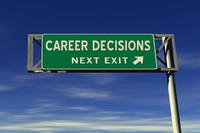You have told your boss you are moving. You are doing everything you can to make this change easy on your boss. Did know you should ask for a recommendation before you leave?
Here’s how to walk out the door with the letter of recommendation and digital endorsement that will help you get your next job in no time.
Why You Need It Before You Leave
Marni is an Army spouse who has worked in human resources for the last 15 years in the Dallas area.
“One girl came in with her references already printed out, and I’d never seen anything like it,” she said. “It was so smart! I’m already sympathetic to military spouses, but this was entirely new. With those references on letterhead included in her application, it was clear she took us seriously. What can we do? We took her seriously, too.”
Related: Does your resume pass the 6-second test? Get a FREE assessment.
Impressing HR is not the only reason you would want to have a letter of recommendation in hand before you hit the road. Between your last PCS and your next one, it is possible that there has been lots of turnover at your old company.
Having a letter of recommendation from your supervisor means that even if none of the people you worked with are still there, someone from that company is still speaking to your success.
Moreover, you want your supervisors to be able to sing your praises while your memory is still fresh in their minds. There is no better moment to do that than when you are busy doing everything you can to make your departure easy on them.
Add to that that looking for a new job with a letter of recommendation in hand to show an interviewer, a mentor or the person who knows someone who is hiring for your perfect job puts your best foot forward, and you have no reason not to ask for one.
Ariel, the Army spouse whose application included the reference letters that so impressed Marni, said she began asking for reference letters before she left her job when her husband enlisted.
“It’s something I can take with me that proves I am who I say I am and that I can do what I say I can,” said Ariel. “My resume should say that, and so should my cover letter, but this really does. I attach a letter from my last two employers every time I apply for a job.”
How to Ask for the Letter of Recommendation
As long as you’re on good terms with your supervisors, they are going to expect you to ask for a reference at some point in the future. There is nothing wrong with asking them to think about that now so that you can have a letter you can take with you.
Email is a great way to ask for a letter of recommendation, especially if you feel a little awkward about it. Jodi Glickman, author of Great on the Job, frequent employment writer for the Harvard Business Review and a professor at Cornell University, says you need to start your request by highlighting the qualifications of the person you are asking.
“When reaching out to ask for a letter of reference, explain up front and center why it is that you value that person’s opinion and respect their professional expertise enough so that you chose them [of all people] to vouch for you in your next professional endeavor,” she says.
Take this as an opportunity to tell them exactly what you have learned from them and why they can speak with authority about what you offer your next employer.
Next, lay out what you would like the letter to say. What were your great successes in this job? What skills do you want to highlight that you mastered in your time here? What projects are you most proud of?
Once you know what you want your supervisor to say, make it easy on her. You might even want your employer to address the fact that you are a military spouse with a simple statement like “Although ___ has to move when the military says so, she is a dedicated worker whose impact will be felt long after she’s moved on.” Tell your employer you want them to say this; it’s the only way they are going to know.
“Provide a template,” Jodi urges. “An outline, bullet points, or even a fully baked draft.” This is not about putting words in your boss’s mouth. Instead, this is an opportunity for you to acknowledge that you are asking the person you work for to do some work for you. Do everything you can to make that job easier.
Before you conclude the request, it is important give the person you are asking an “out.” They might not feel comfortable giving you a reference, or they may just not have the time right now. You need to give them the leeway to say so.
Jodi suggests text like “If for any reason you don’t feel comfortable writing a letter on my behalf, I completely understand.” But remember, if this is someone you are planning to look to as a reference in your job search, they probably know how great you are and would not hesitate to sing your praises.
And Don’t Forget a Digital Endorsement
You also want to be able to leave with a great LinkedIn recommendation or endorsement. This is particularly important if your employer is not able to write you a formal letter of recommendation. Why do you need to get that digital thumbs up?
“It’s the first thing your future employer may see about you!” says Marni. “I do a thorough Google search of everyone who applies for a job here. LinkedIn is one of the first things that comes up.”
Think of this as your very first foot in the door. You have applied for the job. You have made it to the top of the heap (no doubt thanks to the great recommendations you included in your application). Your cover letter is sitting in front of your potential boss and she takes to the Internet. You want what she finds to be indicative of how wonderful you are, and that means controlling what is out there.
Related: For the latest veteran jobs postings around the country, visit the Military.com Job Search section.
Asking for specific recommendations on LinkedIn is step one. To ask your boss -- or anyone else with whom you work -- to say something great about you in such a public forum, first make sure they are online and you are connected. If they are, login to start your request.
“The best LinkedIn recommendations are the ones that offer specific results or tell a story of transformation,” says Laura Rubinstein, employment coach and Certified Social Media Marketing Strategist. “No matter what line of work you’re in, having glowing recommendations throughout your profile will serve you well.”
That means your request for a recommendation online will look a lot like your offline, hard copy request: you are going to draft it for them. “When asking for a LinkedIn recommendation, customize the message with specifics on how you want your contact to recommend you,” Laura says. “In fact, make it easy and write it for them and let them know they can adjust it as they want.”
That means you need to think through the narrative you want for your recommendation. What state was the department in before you came on the scene? Was there a problem in place you that readily solved? What positive experiences did the company have while you worked there? What specific results did your actions produce?
Don’t forget to include the words “highly recommend” someplace in your draft. “You are guaranteed to get that killer recommendation only if you write it,” says Laura.
Back in Dallas, Marni says that LinkedIn references and letters of recommendation can make all the difference when you start out in a new town. “I’m a military wife too, so I get it. It’s hard. We’ve been really lucky to stay in the same place. But I say to every wife I meet, go ahead and ask for these things. Just ask! If they say yes, you get to walk into an interview with your references in hand. Nobody else is thinking that through. And you need to do something to set yourself apart.”
Glowing references in hand, it does not matter where your next PCS will take you. You are armed and ready to get that new job as soon as you arrive.
Looking for more job tips?
Sign up for a free Military.com membership to have military news, updates and job resources delivered directly to your inbox.























